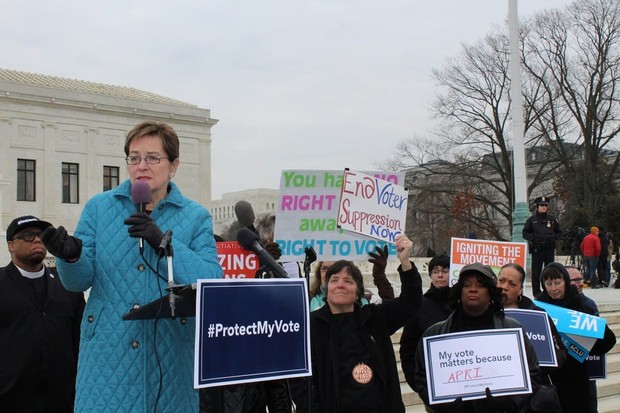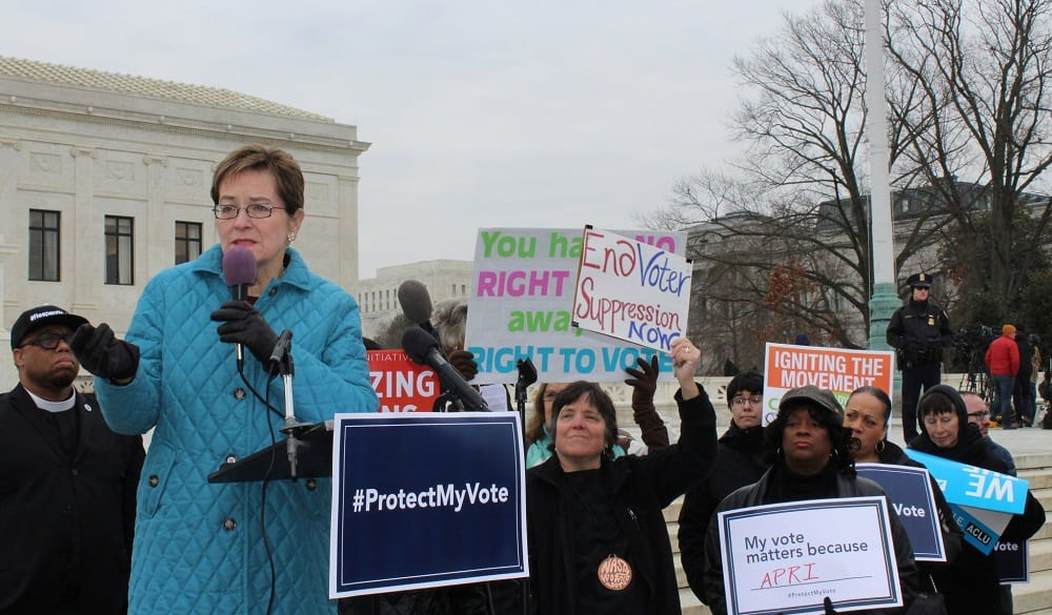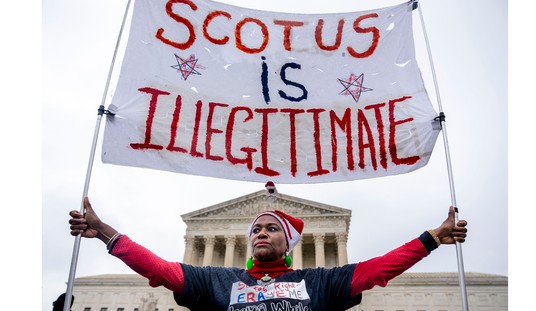
Congresswoman Marcy Kaptur (D-OH), Dean of the Ohio Delegation, spoke at a press conference at the U.S. Supreme Court to defend the constitutional rights of Ohioans who have been purged from voter rolls and to condemn the clear voter suppression implicit in denying eligible citizens access to the ballot box. The Supreme Court heard oral arguments in Husted v. A. Philip Randolph Institute. The case revolves around Larry Harmon, who tried to vote in an Ohio local election in 2015 only to find that the state had removed him from the voter rolls because he had not voted since 2008. Image by Cong. Marcy Kaptur via Flickr Creative Commons https://www.flickr.com/photos/106583696@N08/
One of the key fights for our democratic form of government is at the ballot box. For a democracy to work, the people must have confidence that only those people eligible to vote are allowed to vote. It falls to county and city voting officials to ensure the voter rolls are purged of the deceased and decamped. There are a lot of ways to do this and the way Ohio came up was this. If you miss a two federal elections and their primaries, the county sends you a post card asking you to confirm you are still a) alive and b) at that location. If you respond, all is well. If you vote in either of the next two elections, all is well. But if you miss the next two federal elections you are removed from the voting rolls.
In 2015, a guy named Larry Harmon showed up to vote on a local initiative. Harmon’s problem was the last time he cast a vote was in 2008 and he was sort of sloppy about even reading his mail. He wasn’t on the voter roll, and, as far as I can make out, was not allowed to vote. (A brief side trip here. I’m chief judge in a voting precinct. I have been for six years. In my state I would have issued Harmon a provisional ballot. He would have cast it. The Board of Elections would have examined his ballot the week after the election. They would determine that he was eligible to vote and added his ballot to the total and put him back on the voter rolls for next election. A 100% no-harm-no-foul situation. I don’t know how Ohio works this issue.)
Keeping with their M.O. of ensuring the voting process is as open to abuse as they can make it, a leftwing advocacy group, the A. Philip Randolph Institute filed suit saying booting Harmon from the voter rolls was against federal law. The federal law say you can purge voting rolls, like by sending post cards, but you can’t use failure to vote as a reason to purge voters. Ohio prevailed in federal district court but 6th Circuit reversed saying that because the failure to vote triggered the mailing of the post card that it was actually Harmon’s failure to vote that got him booted and therefore violated federal law.
The Supreme Court agreed to hear the case and did so yesterday.
With Neil Gorsuch on the bench (yeah, I know, I’m not allowed to mention Gorsuch as an accomplishment by Trump because he’ll eventually die and then it won’t mean anything) the case was looking good for a 5-4 decision. Even Anthony Kennedy seemed to be on Ohio’s side. But this is the clencher:
In what could be an ominous sign for the challengers, Breyer seemed frustrated that states were left with what he seemed to regard as an impossible task. How, he asked [Paul Smith, who represented the challengers], are states supposed to track people who die or move out of state, to figure out whether they need to be removed from voter-registration lists? “We don’t want them on the voter roll,” Breyer declared. “That used to be a big problem, voting dead people.” He picked up this line of questioning again later on, telling Smith that he didn’t “believe Congress would have passed a statute that would prevent a state from purging a voting roll of people who have died or have moved out of the state.”
And then Breyer and Roberts tag teamed Smith:
Breyer later asked Smith whether a state could send out a card, labeled with instructions not to forward, to voters. If someone has moved, Breyer suggested, “and they wait long enough, and they send it a couple of times, the post office will send it back and then they’ll know the person has moved.”
Smith agreed that such a system would pass muster, leading to Breyer’s next question. In a lot of larger states, like California, Breyer said, it would be prohibitively expensive to send the non-forwardable cards to everyone. So what if the state instead decided to send the non-forwardable cards to people who “haven’t voted in three or four years”? Would that be a problem?
Smith responded that it would not be, as long as the state only removed people from lists when the cards were returned as undeliverable. In that scenario, he explained, the failure to vote would truly not be the trigger for removal, because the state would have “concrete, reliable evidence” that the voter had moved.
Roberts expressed surprise at Smith’s answer. Isn’t your whole argument, he asked, that Ohio’s practice violates federal law because it is triggered by the failure to vote? Smith tried to distinguish the two situations on the ground that under the current practice, the state does not have reliable information that someone has moved – it simply has the failure to respond to the notice, but it was not clear that Roberts was persuaded. He later returned to the topic, suggesting that Smith’s argument turns on the adequacy of the notice that the state provides to voters, rather than whether someone has shown up to vote.
What the left is trying to do is to attack any law that requires the same degree of scrutiny to vote as it takes to by a packet of sudafed. The idea that poor people or minorities are too f***ing stupid to get ID when they are the people most like to patronize places that require ID (payday lenders, pawn shops) is not nonsense it is patently racist. The left wants felons voting. they want incarcerated prisoners voting, they want illegals voting. Because each of those moves increases the size of the natural Democrat constituency. At the same time, they want to strip away from the state its clear authority under the Time, Place and Manner Clause of the U.S. Constitution and prevent the state from being able to regulate in any way who can actually cast a ballot.
I’m hopeful that this becomes a 6-3 or better decision and puts to rest for once an for all these specious and corrupt attacks on the integrity of our voting system.













Join the conversation as a VIP Member